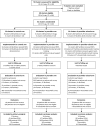Effectiveness of Provider and Community Interventions to Improve Treatment of Uncomplicated Malaria in Nigeria: A Cluster Randomized Controlled Trial
- PMID: 26309023
- PMCID: PMC4550271
- DOI: 10.1371/journal.pone.0133832
Effectiveness of Provider and Community Interventions to Improve Treatment of Uncomplicated Malaria in Nigeria: A Cluster Randomized Controlled Trial
Abstract
The World Health Organization recommends that malaria be confirmed by parasitological diagnosis before treatment using Artemisinin-based Combination Therapy (ACT). Despite this, many health workers in malaria endemic countries continue to diagnose malaria based on symptoms alone. This study evaluates interventions to help bridge this gap between guidelines and provider practice. A stratified cluster-randomized trial in 42 communities in Enugu state compared 3 scenarios: Rapid Diagnostic Tests (RDTs) with basic instruction (control); RDTs with provider training (provider arm); and RDTs with provider training plus a school-based community intervention (provider-school arm). The primary outcome was the proportion of patients treated according to guidelines, a composite indicator requiring patients to be tested for malaria and given treatment consistent with the test result. The primary outcome was evaluated among 4946 (93%) of the 5311 patients invited to participate. A total of 40 communities (12 in control, 14 per intervention arm) were included in the analysis. There was no evidence of differences between the three arms in terms of our composite indicator (p = 0.36): stratified risk difference was 14% (95% CI -8.3%, 35.8%; p = 0.26) in the provider arm and 1% (95% CI -21.1%, 22.9%; p = 0.19) in the provider-school arm, compared with control. The level of testing was low across all arms (34% in control; 48% provider arm; 37% provider-school arm; p = 0.47). Presumptive treatment of uncomplicated malaria remains an ingrained behaviour that is difficult to change. With or without extensive supporting interventions, levels of testing in this study remained critically low. Governments and researchers must continue to explore alternative ways of encouraging providers to deliver appropriate treatment and avoid the misuse of valuable medicines.
Trial registration: ClinicalTrials.gov NCT01350752.
Conflict of interest statement
Figures
References
-
- WHO. World Health Organization (2010) Guidelines for the treatment of malaria, second edition World Health Organization, Geneva: Available: http://www.who.int/malaria/publications/atoz/9789241547925/en/index.html. Accessed 18 June 2013.
Publication types
MeSH terms
Substances
Associated data
Grants and funding
LinkOut - more resources
Full Text Sources
Other Literature Sources
Medical
Miscellaneous




